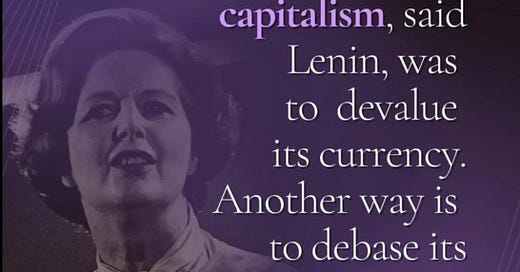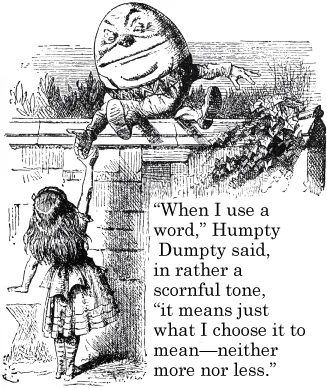“One way to destroy Capitalism, said Lenin, is to devalue its currency. Another way is to debase its language.”
~ Margaret Thatcher, Speech to the Conservative Central Council 1976
Prompted by a recent note by the wonderful
, whose counts amongst the best Substacks on this platform, and scratching an itch started by reading ’s recent piece on “Liberal Authoritarianism”, I am republishing an essay I first wrote in 2022 celebrating Victor Klemperer’s uniquely insightful work “LTI - Lingua Tertii Imperii” and the deliberate corruption of language as a means of propaganda and framing of political reality in the Third Reich. In David’s (excellent and helpful) piece he states that “Most people do not have anything like an adequate conceptual framework, or even the terminology, to understand this” underlining the fact that often our language does not adequately allow us grasp reality especially when words have been co-opted by one class to mean something else entirely. So here it is:“When I use a word,’ Humpty Dumpty said in rather a scornful tone, ‘it means just what I choose it to mean — neither more nor less.’
’The question is,’ said Alice, ‘whether you can make words mean so many different things.’
’The question is,’ said Humpty Dumpty, ‘which is to be master — that’s all.”―Lewis Carroll,Through the Looking Glass
At the bottom of our lane at the quiet end of Wicklow County on Ireland’s magical East Coast, tucked away from view behind old wrought iron gates and an enormous ancient chestnut tree lies a pretty Georgian house, somewhat larger and more genteel than a farmhouse but not grand enough to be manorial. It is a peaceful place in a peaceful corner of the county just down the hill from one of the many holy wells of St. Patrick that are dotted around this country and which, if they gushed oil instead of peaty, oil-coloured water would make Ireland one of the richest countries on the planet. It already is of course, just not in a practical, money sort of way.
Where was I? Oh yes, the house. The house has a small claim to fame in that- for the duration of a summer - it was temporary home to the philosopher Ludwig Wittgenstein whose quotation from his “Philosophical Investigations” I have placed as a subtitle to this letter. At the time - 1951 - Wittgenstein was lecturing on Philosophy at the University of Cambridge and, one presumes, beavering away at his “Philosophical Investigations” which was published to great uproar in the philosophical community in 1953. I find it a little difficult to imagine how “an uproar” amongst Professors of Philosophy actually manifests and imagine it is not at all like the first minute on the commodity trading floor of the Chicago Board of Trade after the publication of an unexpected crop report.
The uproar was caused by Wittgenstein’s almost complete refutation of his previous masterpiece “Tractatus Logico Philosophicus” (1921) which itself formed the basis of the whole logical positivism movement that defined how philosophers viewed their craft and without which presumably half as many Gitanes cigarettes would have been smoked in the intellectual salons of Paris in the three intervening decades.
Conscious of not wishing to bore you to tears, the nub of the two works lies in the two different ways in which language is constructed and how it is used. Tractatus posits a “picture” theory of language, which states that reality is based on facts that language attempts to capture as best it can by creating a picture or model of that reality. The philosopher’s job is to deconstruct language to get at the underlying and presumably immutable truth - language both gets in the way of and points the way towards that truth.
“Investigations” refutes that claim. Tim Raynor, writing in “Philosophy for Change” relates
By the 1930s, Wittgenstein had decided that the picture theory language was quite wrong. He devoted the rest of his life to explaining why [….]Wittgenstein’s shift in thinking, between the Tractatus and the Investigations, maps the general shift in 20th century philosophy from logical positivism to behaviourism and pragmatism. It is a shift from seeing language as a fixed structure imposed upon the world to seeing it as a fluid structure that is intimately bound up with our everyday practices and forms of life. For later Wittgenstein, creating meaningful statements is not a matter of mapping the logical form of the world. It is a matter of using conventionally-defined terms within ‘language games’ that we play out in the course of everyday life. ‘In most cases, the meaning of a word is its use’, Wittgenstein claimed, in perhaps the most famous passage in the Investigations. It ain’t what you say, it’s the way that you say it, and the context in which you say it. Words are how you use them.
Communication, on this model, involves using conventional terms in a way that is recognised by a linguistic community. It involves playing a conventionally accepted language game. ~ Tim Raynor, Philosophy for Change March 2014
Wittgenstein’s body of work is crucial to understanding that reality is only capable of being comprehended through language and that the language we use determines the limits of our consciousness. Without words to describe things, those things cannot exist. It is also true that words create reality or at least a perception of reality that would be different if different words were used to describe it. Language captures our perception of reality and that in turn is shaped by the paradigm or prism through which we experience that reality which is, in turn, the product of the construct of ideas and beliefs - mental models if you will - embedded in our subconsciousness and activated by words.
Narrative Early Warning System (NEWS)
Ben Hunt and Rusty Guinn have devoted the last decade at their firm “Epsilon Theory” to uncovering the deliberate use of language and what they refer to as ‘narrative’ and have done extraordinary work in drilling down into the ‘narratives’ that are being deliberately created today implicitly and explicitly to nudge behaviour and influence the paradigm through which we perceive our reality. Ben’s outstanding three-part essay “Narrative and the Metaverse” lays out his theory that ideas are viral in nature - ie life forms completely different from our own that implant themselves in human hosts, propagating through beliefs, language, and then behaviour. Ben is at pains to underscore that narratives are not metaphorically “like” viruses, they are substantially the same. Epsilon Theory has recently announced its mission to bring the core of their narrative work to a broader public in an initiative they are calling a Narrative Early Warning System (NEWS). I urge you to read, follow and inoculate yourself against viral narrative infection by consuming Ben’s content, which to all intents and purposes is practical, AI enabled Wittgenstein.


The Doomberg team also published a similarly themed essay last week under the title “Semantic Shift” which I also recommend you read, as it highlights the subtle way - identified by Wittgenstein and placed at the heart of his Investigations - in which words change or can be deliberately changed to subtly alter consciousness.
That words shape reality has been known since we started using them.
Keep reading with a 7-day free trial
Subscribe to Pitchfork Papers to keep reading this post and get 7 days of free access to the full post archives.






